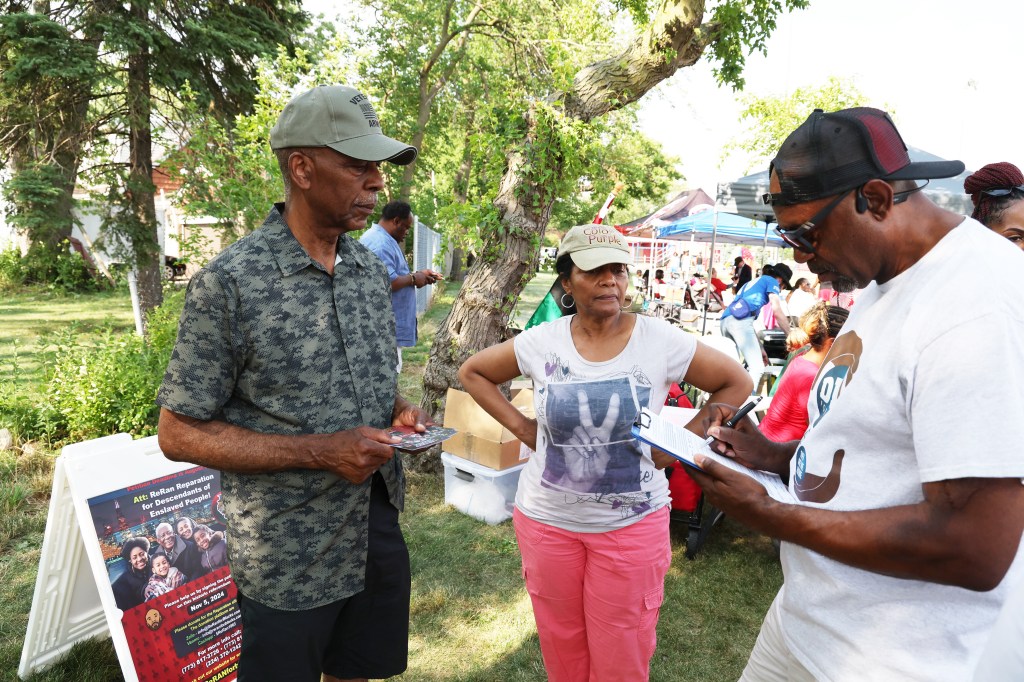
Below the blazing sun on Juneteenth, Howard Ray flagged down cars stopped at a red light by a corner in Chicago’s Austin neighborhood. He stepped into the street and waved, clipboard in hand.
“We’re working on a petition,” he started.
A few rolled down their windows, intrigued. Most nodded politely before driving away.
It’s the reality for a somewhat radical campaign — a petition to end all property taxes for Chicagoans descended from enslaved Africans. Ahead looms an Aug. 5 deadline to collect 100,000 signatures, which would place the referendum on the ballot. As of Wednesday, he’s only amassed a few hundred.
Perhaps it is improbable. Yet Ray’s one-man quest is tinged with hope, grounded in a mission that he believes will outlive him. A movement, he said, that stretches beyond a signature count.
“It’s about putting it out there,” Ray, 54, said Wednesday.
He ambled back to a folding table, strewn with pens and colorful flyers.
“People talk about reparations,” Ray said. “We’re actually doing it. We’re not talking, we’re doing it. This is something that we’re putting into action.”
The petition, dubbed Reconstruction Era Reparations Act Now, or ReRan, calls for 3 cents from Chicago and Cook County sales tax to be allocated to a reparations fund for every transaction. The fund would then cover the property taxes of those with enslaved ancestors. With enough signatures, ReRan would become a nonbinding referendum on the Cook County ballot Nov. 5.
Ray said the grassroots initiative is a critical step in addressing systemic racial inequality in Chicago. As the city’s Black population drops, eliminating property taxes could prevent displacement and pave the way to generational wealth, he added.
“We’re trying to preserve our neighborhood, the identity of Chicago, which includes the descendants of enslaved people and Black people,” Ray said. “Property tax is a mechanism that’s destroying our homes.”
Reparations efforts in Chicago have made recent strides. On Monday, Mayor Brandon Johnson launched a task force to examine the implementation of a reparations program for Black Chicagoans. The announcement cited specific areas of harm, including housing, health, education, mass incarceration and policing.
Evanston began a groundbreaking reparations program in 2022 which provides direct cash payments to Black residents. Ray, a longtime community advocate, said he took inspiration from Evanston’s program. The West Side native has shuffled through several civil service jobs and now works in real estate. He began ReRan after a failed bid for the 37th Ward alderman last year.
“I love people. I think I’m a soldier of God, for humanity, for Earth,” Ray said. “I got great parents, they taught me a lot of things. I just want to give that back, and hopefully other people can have that same experience.”
While policies stem from lawmakers, grassroots efforts are at the core of the reparations movement, according to Kamm Howard, the executive director of Chicago-based nonprofit Reparations United. Community work like Ray’s allows officials to gauge public opinion on issues, he said.
“Lawmakers are moved by how many voices are speaking to an issue,” Howard said. “Very seldom do we have a lawmaker or legislator who wants to move the reparations issue. Many of them have to be forced or convinced.”
Howard, who has worked with Ray in the past, said he admires and supports his commitment to the cause. He too points to property taxes as a driving force of racial inequality.
“We can’t stop pushing for things that may seem radical or unattainable, just because they’re radical,” Howard said. “We have to push forward.”
Ray’s father, Howard Ray Sr., ever-present in his son’s advocacy endeavors, sat quietly in a folding chair beside him Wednesday. He watched his son approach a pedestrian across the street.
“We’ve been waiting for something like this for a while,” Howard Ray Sr. said simply. His great-grandparents were slaves.
Even with his parents at his side, Ray concedes that the petition’s future is uncertain. And other aspects of the proposed policy remain unclear, such as how Chicagoans would prove their ancestry.
Ray reflected on the daunting task ahead of him. Still, he likened his efforts to a prayer: unseen but unwavering.
“People pray about cancer,” Ray said. “Sometimes prayers don’t happen right away, but it goes into the universe, and then maybe 50 years later, a young person becomes the greatest scientist of all time and cures cancer. And so that prayer has been answered.”

